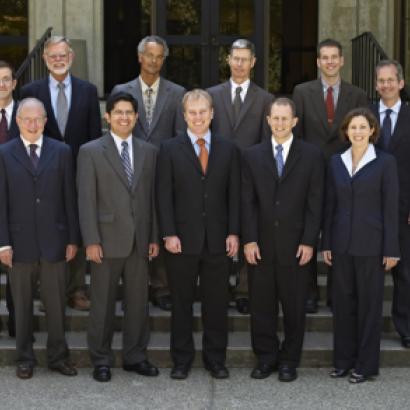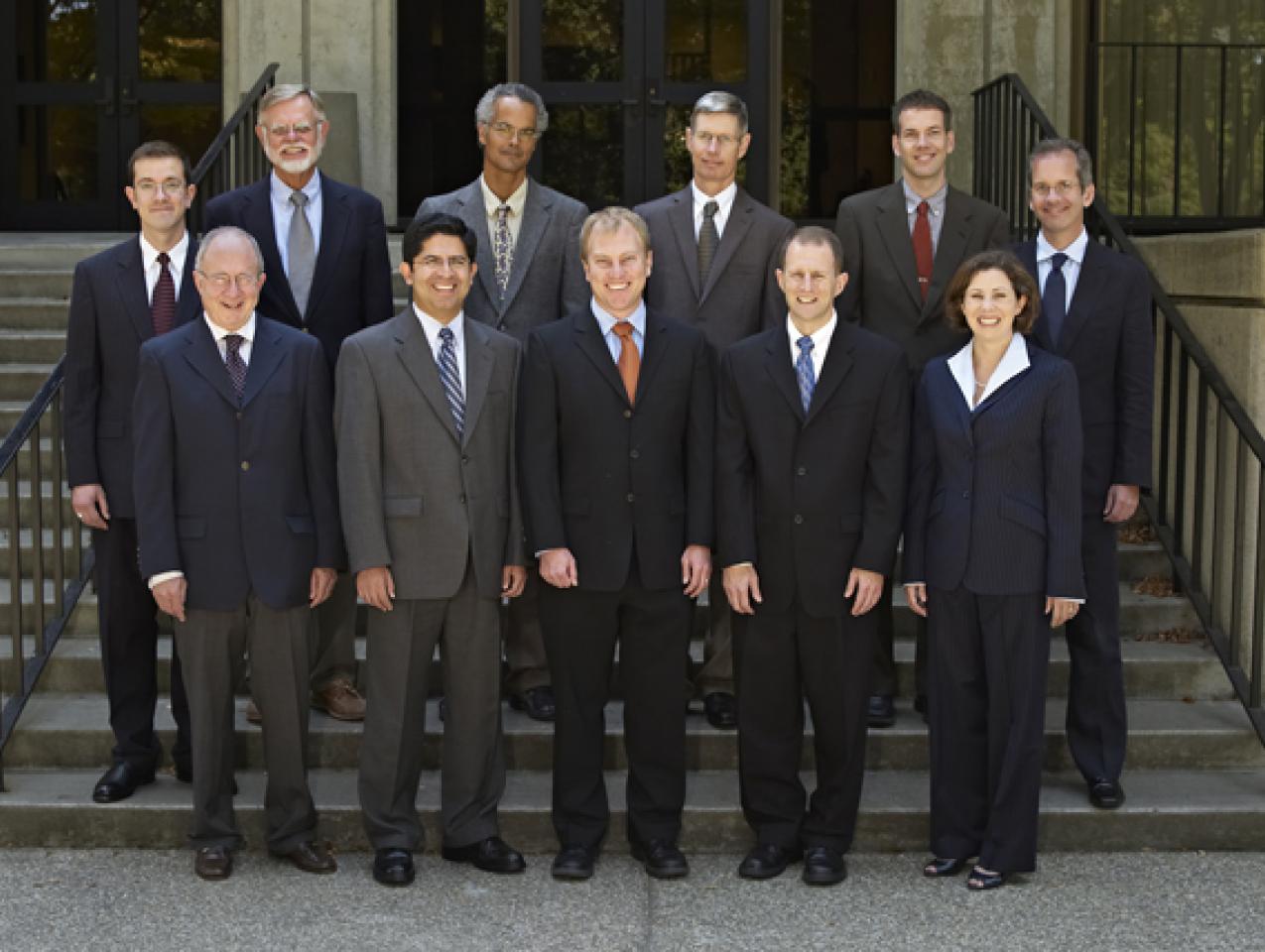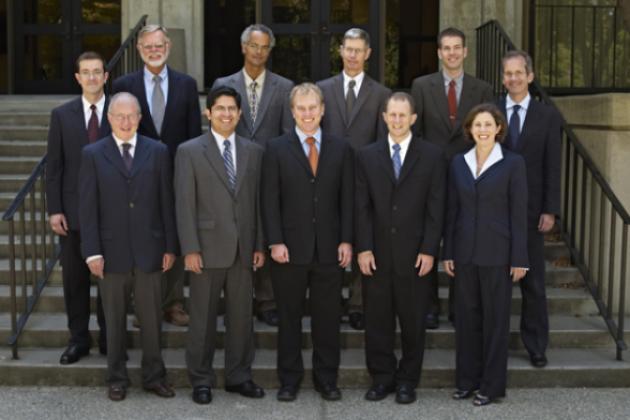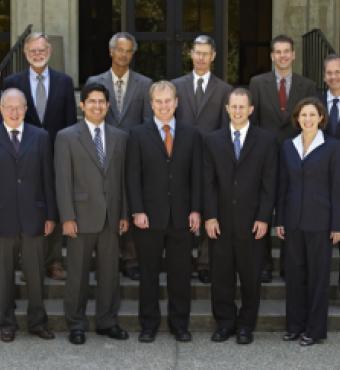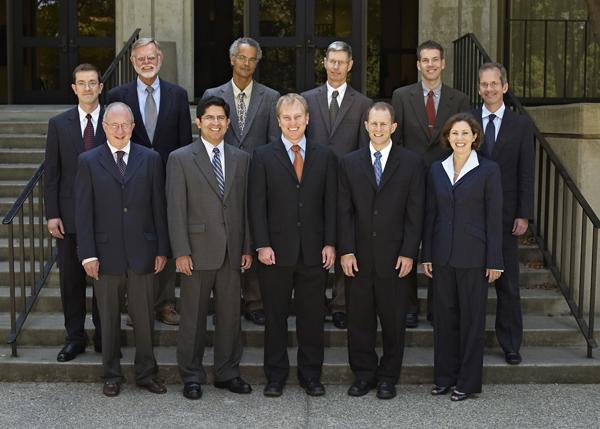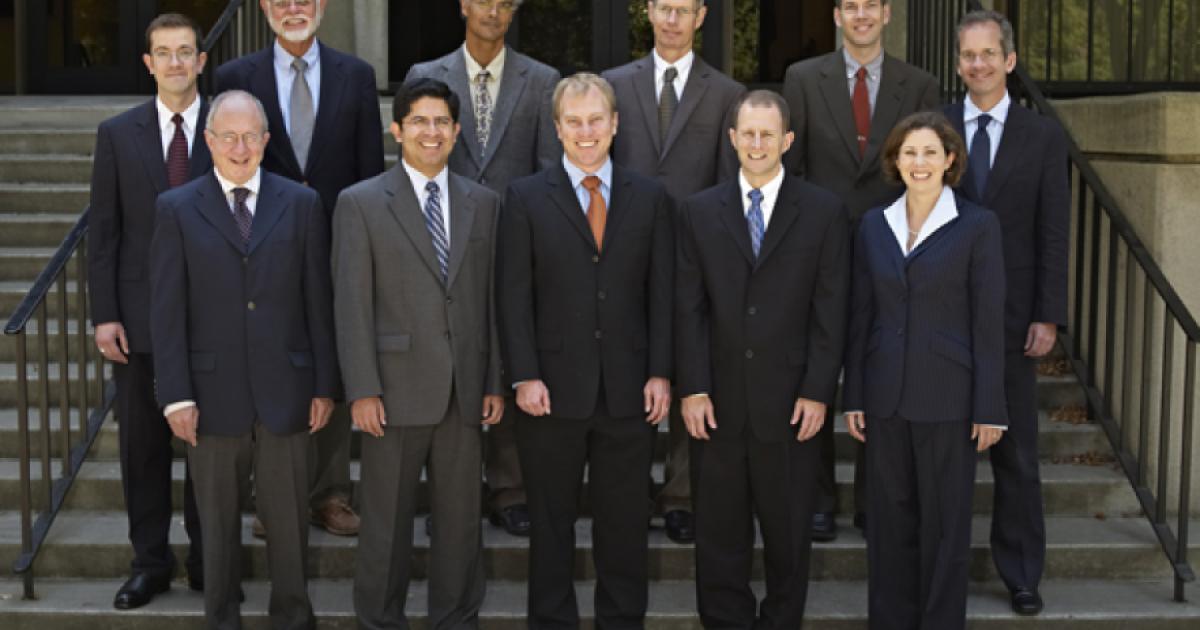
John Raisian, the Tad and Dianne Taube Director at the Hoover Institution, has announced the recipients of the annual postdoctoral W. Glenn Campbell and Rita Ricardo-Campbell National Fellows Program for the 2011–12 academic year.
Recognized as one of the preeminent fellowships in the United States, the program has awarded nearly five hundred fellowships during its thirty-nine years. The national fellows use the time away from teaching to advance their professional careers by completing original and significant research projects at the Hoover Institution.
The program is administered by Hoover deputy director David Brady, the Davies Family Senior Fellow, assisted by program coordinator Cheryl Weissbart.
The 2011–12 fellows, academic affiliations, and topics are
Michael D. Bordo
Michael D. Bordo is a professor of economics and director of the Center for Monetary and Financial History at Rutgers University, New Brunswick, New Jersey. He has held previous academic positions at the University of South Carolina and Carleton University in Ottawa, Canada. He has been a visiting professor at the University of California at Los Angeles, Carnegie Mellon University, Princeton University, Harvard University, and Cambridge University, where he was Pitt Professor of American History and Institutions, and a visiting scholar at the International Monetary Fund, the Federal Reserve Banks of St. Louis and Cleveland, the Federal Reserve Board of Governors, the Bank of Canada, the Bank of England, and the Bank for International Settlement. He is a research associate of the National Bureau of Economic Research, Cambridge, Massachusetts. He is also a member of the Shadow Open Market Committee. He has a BA degree from McGill University, an MSc (economics) from the London School of Economics, and PhD from the University of Chicago in 1972. He has published many articles in leading journals and ten books in monetary economics and monetary history. He is editor of a series of books for Cambridge University Press: Studies in Macroeconomic History.
Matthew Carnes
Matthew Carnes, SJ is an assistant professor in the Department of Government at Georgetown University. His research examines labor and social welfare policy, with particular interest in the political economy of redistribution. His recent publications include “Social Policy in Developing Countries” (with Isabela Mares), Annual Review of Political Science, 2009; “Political Stability under Uncertainty: Applying Bounded Rationality to the Study of Governance and Civil Conflict” (with Neil Malhotra), British Journal of Political Science, 2008; and “The Welfare State in Global Perspective” (with Isabela Mares) in the Oxford Handbook of Comparative Politics, 2007. He holds a PhD in political science from Stanford University and has been a visiting fellow at the Kellogg Institute of International Studies at the University of Notre Dame.
Elizabeth “Lisa” Cobbs Hoffman
Cobbs Hoffman received her PhD from Stanford in 1988; she is currently the Dwight Stanford Chair in American Foreign Relations at San Diego State University. She has written on nongovernmental actors, focusing particularly on Latin America, but also in the global arena. Her books include The Rich Neighbor Policy: Rockefeller and Kaiser in Brazil, for which she won the Allen Nevins and Stuart Bernath Prizes, and All You Need Is Love: The Peace Corps and the Spirit of the 1960s. In 2011 she published Broken Promises: A Novel of the Civil War, which focused on Anglo-American tensions during the Civil War. Aimed at the general public, Broken Promises won the San Diego Book Award and was adopted by Target Stores for its Emerging Authors Collection. For six years, Cobbs Hoffman sat on the Historical Advisory Committee to the US State Department. She is completing a history of American foreign relations since 1776 and beginning a new novel on Alexander Hamilton.
Brian J. Gaines
Brian J. Gaines is a professor at the University of Illinois, with appointments in the Department of Political Science and at the Institute of Government and Public Affairs. He received a BA (with honours) from the University of British Columbia and his AM and PhD from Stanford University, where he was also the playing president of the ice hockey club. Most of his research deals with elections, electoral rules, and public opinion; his recent work has appeared in such outlets as the American Statistician, American Journal of Political Science, Journal of Politics, and Political Analysis. With Wendy Cho and Jake Bowers, he coedits the Political Methodologist; since July 2011, he has been the editor of American Politics Research. Between 2005 and 2007, he completed marathons on all seven continents.
Karen Jusko
Karen Jusko is an assistant professor of political science at Stanford University and a faculty affiliate of Stanford's Europe Center and the Center for the Study of Poverty and Inequality. Jusko's research is motivated by questions about the origins of contemporary democratic politics in the United States and Europe. Using survey research and historical census data, Jusko's current book project ties the different components of democratic representation--participation, party politics, and the policy-making process—to legislators' and political parties' electoral incentives. This research builds on Jusko's dissertation, which was awarded the Harold D. Laswell Prize for the best dissertation in the field of public policy. Jusko received her PhD from the University of Michigan and has been a fellow at the Center for the Study Democratic Politics at Princeton University. Jusko’s research has been supported by the National Science Foundation, the European Science Foundation, and the Institute for Research in the Social Sciences at Stanford.
Keith Krehbiel is the Edward B. Rust Professor of Political Science at the Graduate School of Business (GSB) at Stanford University, where he teaches courses on legislative behavior, political economy, business-government relations, and ethics. He specializes in US politics and has published two books and dozens of articles on that topic. Krehbiel has been a national fellow at the Hoover Institution, a guest fellow at the Brookings Institution, a congressional fellow in the Senate Republican Leader's Office, and twice a fellow at the Center for Advanced Studies in Behavioral Sciences. Elected to the American Academy of Arts and Sciences in 1994, he received the Sloan Award for Teaching Excellence in 2000 and the GSB PhD Association’s Distinguished Service Award in 2007. In 2005, with Nolan McCarty, Krehbiel cofounded the Quarterly Journal of Political Science, for which he and McCarty are editors in chief.
John Lear
John Lear is the Distinguished Professor of History and Latin American Studies at the University of Puget Sound, where he has taught since completing a PhD at the University of California at Berkeley in 1993. His research focuses on urban social movements, cultural politics, and the role of the state and markets in Latin America; he has written on US-Latin American relations in general and US-Cuban relations in particular. He is currently working on a book on the relation of artists, workers, and the state in postrevolutionary Mexico. Among his publications are Workers, Neighbors and Citizens: The Revolution in Mexico City (University of Nebraska Press, 2001), Chile’s Free Market Miracle: A Second Look (Food First Books, 1995), and "The Old and New Lefts in Latin America" (forthcoming). Teaching and fellowship affiliations include the Center for US-Mexican Studies (University of California at San Diego), the Universidad Autónoma de México-Iztapalapa, and the Centro de Investigaciones de Artes Plásticas (Mexico City).
Peter Lorentzen
Peter Lorentzen is an assistant professor of political science at the University of California at Berkeley. His primary areas of research are the political economy of authoritarianism and economic development, with a regional focus on Chinese politics and a methodological specialty in the application of game theory. He received his PhD in economic analysis and policy from the Graduate School of Business at Stanford University and his BA in Asian studies from Dartmouth College.
His current research concerns the informational problems faced by China's authoritarian leadership in managing a large, diverse, and decentralized political economy in the midst of a major economic transformation, analyzing the trade-offs that often arise between the goals of political stability and the effective monitoring of local officials and evaluating policy effectiveness. Aspects of his research address popular protests, media freedom, and political dissent.
Henry R. Nau
Henry R. Nau is a professor of political science and international affairs at the Elliott School of International Affairs, George Washington University. He holds a PhD degree from Johns Hopkins University School of Advanced International Studies. From January 1981 to July 1983, he served on President Reagan's National Security Council as senior director for international economic affairs.
His published books include Perspectives on International Relations: Power, Institutions, and Ideas, 3rd edition (CQ Press, 2011), At Home Abroad: Identity and Power in American Foreign Policy (Cornell University Press, 2002), and The Myth of America’s Decline: Leading the World Economy into the 1990s (Oxford University Press, 1990). His most recent articles include “Ideas Have Consequences: The Cold War and Today,” International Politics, July 2011, and “Obama’s Foreign Policy: The Swing Away from Bush,” Policy Review, April/May 2010.
Armando Razo
Armando Razo is an associate professor of political science at Indiana University. He is a comparativist who studies the political economy of development with a focus on Latin America. His research agenda is built around two themes: (1) how formal and informal institutions in developing countries affect public policies and economic performance and (2) the study of political institutions and political organization in nondemocratic settings. He approaches these themes with an integrative methodology that combines economic history with institutional and social network analysis.
Razo is the author of Social Foundations of Limited Dictatorship (Stanford University Press, 2008) on policy making in dictatorships. He is coauthor, with Stephen Haber and Noel Maurer, of The Politics of Property Rights (Cambridge University, 2003). He has published articles in World Politics, the Journal of Economic History, and the Journal of Latin American Studies.
Jonathan Rodden
Rodden is an associate professor in the political science department at Stanford who works on the comparative political economy of institutions. He has written several articles and a pair of books on federalism and fiscal decentralization. His most recent book, Hamilton’s Paradox: The Promise and Peril of Fiscal Federalism, was the recipient of the Gregory Luebbert Prize for the best book in comparative politics in 2007. He frequently works with the World Bank and the International Monetary Fund on issues related to fiscal decentralization.
He has also written papers on the geographic distribution of political preferences within countries, legislative bargaining, the distribution of budgetary transfers across regions, and the historical origins of political institutions. He is currently writing a series of articles and a book on political geography and the drawing of electoral districts around the world.
Rodden received his PhD from Yale University and his BA from the University of Michigan and was a Fulbright student at the University of Leipzig, Germany. Before joining the Stanford faculty in 2007, he was the Ford Associate Professor of Political Science at the Massachusetts Institute of Technology.
Nicholas Quinn Rosenkranz
Rosenkranz is a law professor at Georgetown University. He earned his BA and JD from Yale. He then clerked for Judge Easterbrook on the Seventh Circuit (1999–2000) and for Justice Kennedy at the US Supreme Court (2001–2). After that, he served as an attorney-adviser at the Office of Legal Counsel (November 2002–July 2004). Rosenkranz is developing a new theory of constitutional interpretation and judicial review. The first two installments, “The Subjects of the Constitution” and “The Objects of the Constitution,” were recently published in the Stanford Law Review. The comprehensive version is forthcoming as a book by Oxford University Press. Rosenkranz publishes in the nation’s top law reviews; he often testifies before Congress as a constitutional expert; and he has argued before the US Supreme Court. He also serves on the Board of Visitors of the Federalist Society.
Michael Tomz
Tomz is a professor of political science at Stanford University. He is also a senior fellow at the Stanford Institute for Economic Policy Research and at the Stanford Center for International Development.
Tomz’s research ranges across the fields of international relations, political economy, public opinion, and statistical methods. He is the author of Reputation and International Cooperation: Sovereign Debt across Three Centuries (Princeton University Press, 2007) and has published numerous articles in political science and economics journals. He is currently involved in research projects about several of the Hoover Institution’s core themes, including property rights, war, and democratic representation.
Tomz received his PhD from Harvard University. He also holds an M-Phil from the University of Oxford, where he was a Marshall Scholar. He has been a fellow at the Center for Advanced Study in the Behavioral Sciences and a visiting scholar at the International Monetary Fund.







